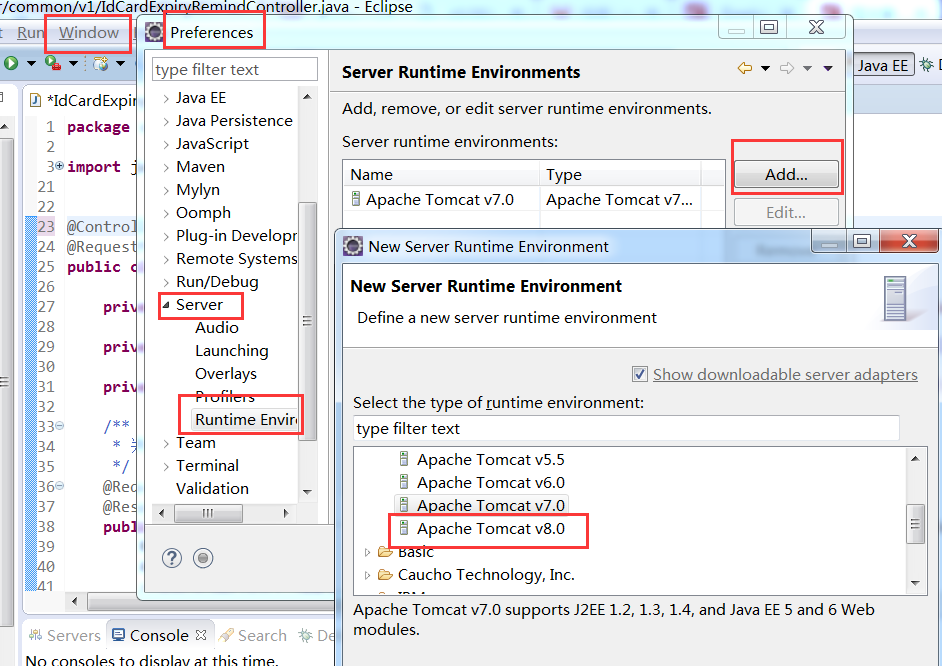
- APACHE TOMCAT LOGS LOCATION HOW TO
- APACHE TOMCAT LOGS LOCATION INSTALL
- APACHE TOMCAT LOGS LOCATION WINDOWS
APACHE TOMCAT LOGS LOCATION WINDOWS
Edit the server.xml file in the NuGenesis Tomcat installation: Where are the Tomcat logs w hen running as a Windows service How do I customize the location of the tomcat logging.properties file Set the following property when starting tomcat: .file.This log-disabled by default in NuGenesis installations-provides information similar to the WWW access log in Microsoft IIS, but from the perspective of Tomcat. To enable the access log: rw-r-r-.The Log levels are, in order from less information to more information: SEVERE, WARNING, CONFIG, FINE, FINER, FINEST, ALLĪpache Tomcat also has an access log file. 1 root root 2558 Mar 30 10:29 tomcat-users.xsd 1 root root 2164 Mar 30 10:29 tomcat-users.xml 1 root root 4144 Mar 30 10:29 logging.properties 1 root root 2313 Mar 30 10:29 jaspic-providers.xsd A file named log4j2-tomcat.xml, log4j2-tomcat.json, log4j2-tomcat.yaml, log4j2-tomcat.yml, or log4j2-tomcat. This support is implemented automatically by including the log4j-api, log4j-core, and log4j-appserver jars in the boot classpath. 1 root root 1149 Mar 30 10:29 jaspic-providers.xml Log4j may be used as the logging framework for Apache Tomcat. 1 root root 1400 Mar 30 10:29 context.xml

1 root root 7262 Mar 30 10:29 catalina.properties 1 root root 12873 Mar 30 10:29 catalina.policy it would be even better if you find a backup folder of your vcenter installation from where you can take the same file: apache-tomcat-9.0.45-src]# cd conf]# ll So just look for the file in a location similar to this one (binaries) and copy it into you vCenter conf/ folder. Onece the file is copied you don't need to do anything else, it will 're-load' the file after a few seconds and the error will be gone.
APACHE TOMCAT LOGS LOCATION INSTALL
In redhat servers, the missing of this file it usually happens when you upgrade tomcat, and the simplest way to correct it is to copy tomcat-users.xml from tomcat binaries and paste it in your install location (in your case /usr/lib/vmware-sso/vmware-sts/conf/tomcat-users.xml). >My requirement was I want to keep 10 days log in the original location and.

Tomcat-users.xml is a default configuration file that normally is not used unless you specifically activate and manage tomcat access creating users at it console (regulary command line). we are using Apache Tomcat and the Log files are generated in one Log DIR in. Not sure when change happened but website logs started stamping in different directory called: C:HOSTSPortal which is very weird. All logs were created for virtual host sites under: /var/log/tomcat8.
APACHE TOMCAT LOGS LOCATION HOW TO
But it still bugged me what is going on, and so far I did not find anthing in the web related to vCenter.Īnyone has an idea what is going on here, and how to resolve this error? I know that there are many ways to ignore it, and maybe it is safe to ignore it, but I only want to know if the error itself can be fixed. We have tomcat server and we hosts multiple websites on one server. VMWare simply tells me to delete the files and to enlarge my log disk, which I did. Java.io.FileNotFoundException: /usr/lib/vmware-sso/vmware-sts/conf/tomcat-users.xml (No such file or directory)Īt java.io.FileInputStream.open0(Native Method)Īt java.io.FileInputStream.open(FileInputStream.java:195)Īt java.io.FileInputStream.(FileInputStream.java:138)Īt java.io.FileInputStream.(FileInputStream.java:93)Īt .MemoryUserDatabase.backgroundProcess(MemoryUserDatabase.java:700)Īt .UserDatabaseRealm.backgroundProcess(UserDatabaseRealm.java:160)Īt .CombinedRealm.backgroundProcess(CombinedRealm.java:308)Īt .ContainerBase.backgroundProcess(ContainerBase.java:1145)Īt .ContainerBase$ContainerBackgroundProcessor.processChildren(ContainerBase.java:1381)Īt .ContainerBase$n(ContainerBase.java:1353) I checked the content of the log, and every 10 minutes it creates the same error message: T23:59:53.056Z WARN .MemoryUserDatabase Failed to close We found espiecially a lot of log files named "catalina_.log" with 11mb size, going back almost a year. According to VMWare KBs we checked what is consuming space. We were receiving errors on our vCenter servers that the log disk is getting low on disk space.


 0 kommentar(er)
0 kommentar(er)
